The Diversification GameNew EmployeesStanding PatA Business Model Twist Mechanical Hub caught up with some business owners regarding business diversification and growing their business in an uncertain economy. In this current economic state—with consumer confidence plummeting surrounding recession talk and the realistic repercussions of tariffs, the rising materials prices and an uncertain supply chain—is now the Read more
tariffs
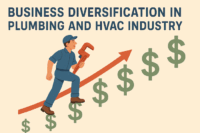
Table of Contents
Mechanical Hub caught up with some business owners regarding business diversification and growing their business in an uncertain economy.
In this current economic state—with consumer confidence plummeting surrounding recession talk and the realistic repercussions of tariffs, the rising materials prices and an uncertain supply chain—is now the right time to add “arms” or services to the existing business? Or stand pat and ride it out? Or cut back?
The Diversification Game
“There’s always some economic boogeyman around the corner,” says Adam Rotherham, owner, Down Under Drainage, Los Angeles. “Recessions are actually decent times to diversify and invest if you’ve got the capital. While competitors are pulling back, you can position yourself for the recovery,”
The tariff situation is a wild card though, says Rotherham. “It’s definitely impacting material costs and availability. I’m keeping a close eye on how that develops before making any major moves.”
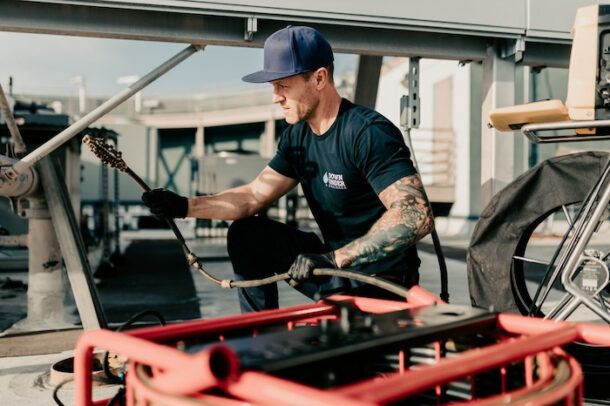
Rotherham says that being in the industry for three decades, he’s seen the cycles and learned that having multiple revenue streams is crucial for stability. “Since moving to LA from Australia 11 years ago, I’ve found the American market both challenging and full of opportunities that weren’t available back home. For me, diversification has always been about risk management, but also about staying relevant,” says Rotherham.
But what’s stopping Rotherham from going all-in on diversification? “It’s finding qualified people who share my standards. I’m pretty particular about quality. Training takes time away from billable hours, and in LA’s competitive market, keeping good talent is tough when everyone’s hiring.”
Gaven Johnson, owner of Big Sky Plumbing, Springville, Utah, says the company has been conservative in its growth, “but I have a growth mindset.” A very successful commercial new construction contractor, the 25-employee company excels in medical gas, hospitals, anything from townhomes to condos, and now has opened a service side to the business, Big Sky Service Pros. “No job’s too shitty,” jokes Johnson. And while Johnson also says with “tongue-in-cheek” grin that he gets bored easily, the reality is, “We need to be prepared in case of a shortage in new construction work.”
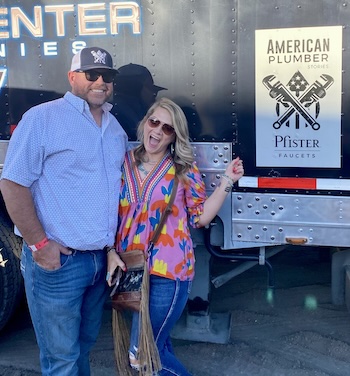
New Employees
As for adding new employees, “I actually went back-and-forth for about a year before hiring my first apprentice about three months ago,” says Keith McGillivary, owner, McGillivary’s Plumbing Services, Gardiner, Maine. Ultimately, the only thing stopping him from doing that sooner was trying to find the right person. “I am super particular and I didn’t want to just hire somebody that was already out in the field.

And while McGillivary has noticed service work as well as new construction slow down, he says it did make it tough to justify bringing on employees. “Ultimately, at the end of the day, I decided to hire somebody with no experience that was just a good person in general that I could train the way I wanted so that I would have the ability to have somebody working while I was down the road.”
McGillivary also recently added drain cleaning and sewer line inspection to his business because he kept turning down calls in his area. “It’s a big investment upfront, hoping that it pays off,” says McGillivary.
Standing Pat
Chris Armstrong, Armstrong Professional Services, Hudson Valley, N.Y., offers a different perspective. “As far as diversification goes, with the recent boom of all the new kind of traditional service plumbing companies and P and H companies turning into home service companies, I think me personally—this June is 21 years l’ve been in business for myself—I already have always been the guy that did plumbing HVAC, service plumbing, well pumps, gas, oil,” says Armstrong. “I pretty much do everything already and I think I’m kind of leaning towards going the other way and tightening down to the things that I make that I get the most calls for and that I make the most money with.”
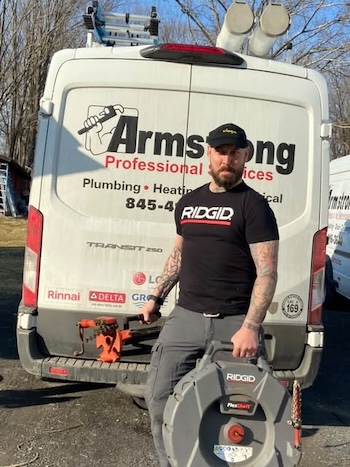
Armstrong questions that the more stuff one offers, what are they going to do, change tires and add roofs? “If these guys can make it happen, I think that’s great, but I also think part of that kind of takes away from the specialty of our trade as plumbers and gas fitters and HVAC contractors to where it doesn’t look good. I feel like it’s almost going in reverse. Why would you want the guy putting in your heating system that’s that can also do your pool cleaning and put your roof on. I feel like it just takes away from all the trades,” says Armstrong.
One thing that Armstrong stresses is to pay attention to pricing. When it pertains to tariffs more specifically, “l may be losing money not paying attention to these price hikes. I’m used to pricing things out at either a flat rate or adding this lump in that I would normally know off the top of my head, and now I’m way off,” says Armstrong.
A Business Model Twist
Adding a unique perspective on diversification, Khadija Head, owner, Head’s Plumbing Sales and Service, Inc., Atlanta, is looking to add to the company’s existing business models, and that something is water filtration. In today’s society where social media, personal appearance, and health is a sense of currency, we are shifting the focus to ‘It starts with the water you consume,’” says Head.
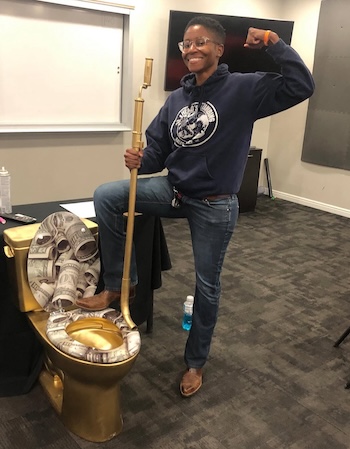
Head says that if you look at the day-to-day lives of individuals, water is the number one factor for individuals trying to find that fountain of youth. Homeowners are very conscious of the water they are consuming, says Head, whether they are drinking it through their faucets, bathing in it or cooking with it. “We’re more focused on the current societal trend in which everyone’s looking for the fountain of youth and trying to find that cutting edge. So, when the post themselves on social media, for example, they’re looking their best and brightest self, and that always starts with the water that they are consuming,” says Head.
According to Rotherham, the plumbing trade isn’t what it was when he started. “With new technologies, changing regulations, and shifting customer expectations mean you’ve got to evolve or get left behind,” says Rotherham.
To sign up for our weekly newsletter, https://mechanical-hub.com/enewsletter/

https://vimeo.com/1076182999 With tax day come and gone, we hope Uncle Sam was gentle on you. Speaking of Uncle Sam, how the heck did he get that moniker? We also continue our talk on tariffs, we fire up Taco After Dark, we also talk action figures. Also, check out our podcasts. Taco After Dark Read more
With tax day come and gone, we hope Uncle Sam was gentle on you. Speaking of Uncle Sam, how the heck did he get that moniker? We also continue our talk on tariffs, we fire up Taco After Dark, we also talk action figures. Also, check out our podcasts.

https://vimeo.com/1074098129 On this Weekly Update—April 11, 2025, we talk tariffs, a visit with American Plumber Stories while some plumbers prepare for a turkey hunt and we visit with our friends at InSinkErator Read more
On this Weekly Update—April 11, 2025, we talk tariffs, a visit with American Plumber Stories while some plumbers prepare for a turkey hunt and we visit with our friends at InSinkErator.

https://vimeo.com/1038401163 Welcome back to our weekly update. Another Friday the 13th? Oooph. I hope everyone gets through the day without any black cats, walking under ladders, you know the drill. What are you superstitious about? We hope you have a great day, nonetheless. On this update, we’ll talk heat pump water heaters, the effects of Read more
Welcome back to our weekly update. Another Friday the 13th? Oooph. I hope everyone gets through the day without any black cats, walking under ladders, you know the drill. What are you superstitious about? We hope you have a great day, nonetheless. On this update, we’ll talk heat pump water heaters, the effects of potential tariffs from the new president, and our new podcasts.

There has been some tough rhetoric coming out of president-elect Trump’s camp regarding tightening the screws on imported goods by implementing a hefty tariff on countries such as China, Mexico and Canada, to name a few. Is this a good attempt to bring more manufacturing stateside? How will this affect the economy? Is this even Read more
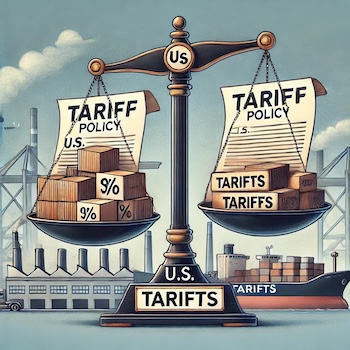 There has been some tough rhetoric coming out of president-elect Trump’s camp regarding tightening the screws on imported goods by implementing a hefty tariff on countries such as China, Mexico and Canada, to name a few. Is this a good attempt to bring more manufacturing stateside? How will this affect the economy? Is this even a good idea? We talk to some industry leaders about tariffs and what it means for the U.S. economy moving forward.
There has been some tough rhetoric coming out of president-elect Trump’s camp regarding tightening the screws on imported goods by implementing a hefty tariff on countries such as China, Mexico and Canada, to name a few. Is this a good attempt to bring more manufacturing stateside? How will this affect the economy? Is this even a good idea? We talk to some industry leaders about tariffs and what it means for the U.S. economy moving forward.
Recently, on the Crosstalk episode of the Make Trades Great Again and Appetite for Construction podcasts, this very topic came up and Andy Mickelson, Mickelson Plumbing and Heating, Missoula, Mont., and Eric Aune, Aune Plumbing, Zimmerman, Minn., were in unison in their view on tariffs. “There will be an impact,” says Mickelson. “Every single item that we touch has some impact from an imported product or good. And to sit back and believe that it’s not going to have a day-to-day impact or a cost increase is foolish.”
“It’s a tax that’s going to kill sales; it’s definitely going to affect us moving forward, especially if we see higher tariffs,” says Aune.
Mickelson continues, “There’s going to be a ‘trickle up’ effect, and along with that we’re going to see a lack of material … we saw brief chunk of this in 2021 when we had the port issues and shipping problems, and you extrapolate that into that into that these items aren’t coming because they are too expensive, how do you get around that? You can’t just flip a switch and just say we’re just going to make it here. We’re not ready for that, and I don’t think that this country is ready to become a manufacturing country. I don’t think there enough people who are willing to work on the assembly line … we can’t get people to sign up right now to become a plumber or an electrician or a data communication person—any of those manufacturing-type jobs are very much so in line with what it means to go out and work with your hands, be in a skilled trade.”
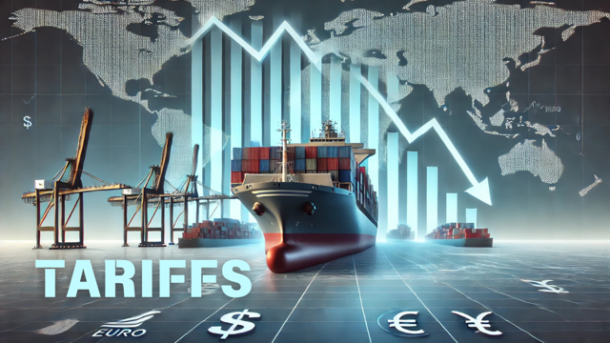
So, the back-and-forth debate continues to brew relating to whether instituting tariffs is beneficial to the American economy and the American worker. Dain Hansen, Executive Vice President, Government Relations, The IAPMO Group, says that economists have different views on the topic of tariffs, but the plumbing industry is well-positioned to support continued domestic production of what our country needs—and increase U.S. exports to other countries.
“Any policy that strengthens our manufacturing muscle is good for the economy and increases job opportunities in the trades. Programs such as the Market Development Cooperator Program and Standards Alliance at USAID, along with the Department of Commerce’s Foreign Commercial Service, provide vital support to U.S. exporters. We hope the administration will continue backing these programs to ensure U.S. products remain competitive overseas. We continue to monitor the impact tariffs are having on our global industry as manufacturing move locations to avoid these costs,” says Hansen.
While IAPMO is cautiously optimistic and vigilant, Plumbing Manufacturers International (PMI) shares concern. “During his campaign, President Trump spoke about his desire to increase tariffs—as high as 60% on Chinese goods, 10% to 20% across the board on all foreign goods, including Europe, and 25% on imports from Mexico, unless they curb the number of immigrants coming across the border. If he’s successful, these tariffs will have an inflationary impact, increasing the costs of production and in turn the costs of products in the marketplace. That’s certainly one of the biggest concerns plumbing manufacturers have right now.
“Our stance on this issue all along is that tariffs are harmful to the economy because they increase costs for manufacturers and have an inflationary impact on customers wishing to purchase plumbing products. These increased costs lead manufacturers to provide fewer jobs and they have less money for compensation as well. From an economic standpoint, we see no benefits from tariffs. PMI has always been an advocate for free and fair trade among nations,” says Kerry Stackpole, CEO and Executive Director, PMI.
According to Ben Brubeck, Vice President of Regulatory Labor and State Affairs, Associated Builders and Contractors (ABC), tariffs are a negotiating tool to renegotiate policies with other countries. “While having a hard time getting materials from overseas, resolving the domestic supply chain is a good thing.”
